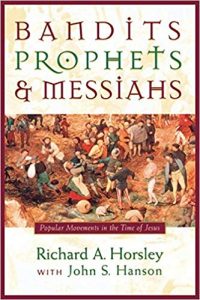 Updated with NT passages for reference
Updated with NT passages for reference
This follows my previous post that set me thinking along a related line. The verse for the day is Horsley’s sentence that I quoted there:
It would thus appear that the supposedly standard Jewish ideas or expectations of the messiah are a flimsy foundation indeed from which to explain early Christian understanding of Jesus.
Now if it is the case that the notion of a Davidic Messiah was something that was only on the horizon of literary elites, and if even there it was an idea to be realized only in a vague and remote future time, and if the idea of a Davidic Messiah was a metaphor and not a genetic son of David, — recall Horsley’s other observation that “Like the title ‘Messiah,’ the explicit term ‘Son of David’ simply does not occur with any frequency in Jewish literature until after the fall of Jerusalem in 70 C.E.” — then should not we raise a questioning eyebrow when we see Jesus being hailed as the Messianic Son of David in the Gospels, and when we read in Romans the claim that Jesus was a Son of David? (Son of Belial, we all know, means a bad person, not a literal son.)
Now in my previous post I pointed out that Horsley said the idea of a Davidic messiah was very rare and confined to literary elites in the time prior to Jesus. Here I look at his discussion of these exceptions.
Qumran — the exception proving the rule
My earliest questioning as I read Horsley was related to Qumran. But here is what Horsley wrote in expectation of my question: Continue reading ““Son of David” as an anachronism (or metaphor?) in the Gospels, Paul and Acts?”

 The answer is, I think, no. In this post I quote a few sections from Professor
The answer is, I think, no. In this post I quote a few sections from Professor